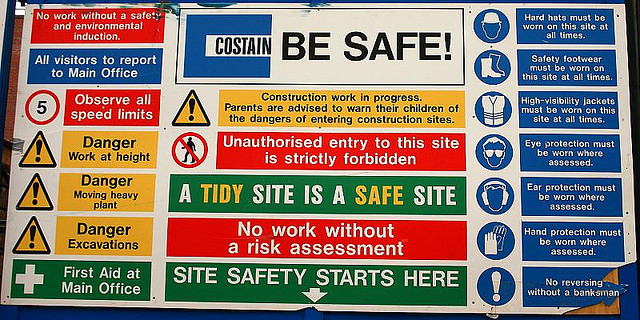Advances in field techniques have recently made hydraulic fracturing— “fracking”—a major part of energy production in the United States and Canada. Frackers pump high-pressure fluids into rock formations to expand cracks and create pathways for valuable hydrocarbons to flow out. The stimulant fluids are usually water-based, with additional chemicals (acids, surfactants, biocides, etc.) to improve effectiveness and solid ‘proppants’ to prop open the expanded openings (sand, etc.). Read my earlier blog here
Audit, Compliance and Risk Blog
Environmental Compliance: California Prepares To Regulate “Fracking”
Posted by Jon Elliott on Wed, Nov 20, 2013
Tags: Health & Safety, California Legislation, Environmental risks, Environmental, EHS, Hazcom, fracking, hydraulic fracking, Oil & Gas
Alert: Upcoming Changes to Requirements for Safety Recalls
Posted by STP Editorial Team on Wed, Oct 23, 2013
Do you know about these changes? Do you know their effective dates? Is your company ready to comply with each and every change? If your answer to any of these is “no”, or you have no idea what this alert is about, you’ll want to see the Federal Register notice that announced and described these changes. A copy can be found here.
Tags: Business & Legal, Health & Safety, OSHA
OSHA Proposes to Regulate Exposures to Respirable Crystalline Silica
Posted by Jon Elliott on Thu, Oct 17, 2013
The US Occupational Safety and Health Administration (OSHA) regulates thousands of chemicals, through a variety of regulatory standards. At the broadest level, employers must evaluate basic information about every potentially hazardous chemical, and provide information to employees in compliance with OSHA's Hazard Communication Standard. OSHA also provides somewhat-more-tailored requirements for classes of chemicals (such as flammables), and for types of activities that pose chemical hazards (such as welding). For a small number of especially hazardous chemicals, OSHA provides a detailed standard applicable to a single chemical—examples include asbestos, benzene, and lead. On September 12, 2013, OSHA published a proposal to establish just such a single chemical standard, for crystalline silica (29 CFR section 1910.1053).
Tags: Business & Legal, Health & Safety, OSHA, Environmental risks, Environmental, Hazcom, fracking, Oil & Gas
Recently, the U.S. Pipeline and Hazardous Materials Safety Administration (PHMSA) and Federal Motor Carrier Safety Administration (FMCSA) issued a new series of notices concerning hazardous materials handling and driver recordkeeping procedures. CMV drivers and transporters of hazardous materials should be alert to the following:
Tags: Business & Legal, Health & Safety, Training, Environmental risks, Hazcom, Oil & Gas
The greenhouse gas cap-and-trade program overseen by California’s Air Resources Board (ARB), which began earlier this year, not only allows for use of approved offsets to meet a portion of an entity’s emission reduction requirements. Entities will soon also be able to comply with the program by participating in its counterpart in the Canadian province of Quebec. By January 1, 2014, ARB’s cap-and-trade program will be linked with Quebec’s. A press release from ARB sums up key features of the linkage:
Tags: Health & Safety, Environmental risks, Environmental, EPA, Greenhouse Gas, ghg
Do you know what's in the chemical products you buy and use, and whether they're "safe?" Effective October 1, 2013, California regulations provide criteria and procedures for state-level identification and listing of likely-hazardous chemicals of concern. Manufacturers and importers will be required to evaluate chemicals of concern in consumer products, their potential alternatives, and how best to limit exposure or reduce hazards. Assemblers and retailers will have related responsibilities. Although these requirements apply directly only within California, any reviews and reformulations are likely to affect global production and distribution decisions.
Tags: Health & Safety, California Legislation, Environmental, EHS, EPA, Hazcom
Motor Carrier Registration Systems to be Upgraded and Web-Based
Posted by Jon Elliott on Fri, Aug 30, 2013
Last week the Federal Motor Carrier Safety Administration (FMCSA) published major changes in the registration requirements it imposes on “motor carriers” that use roads and highways to transport materials—including hazardous materials. Over the next two years, these changes will consolidate four separate registration systems into a new web-based Unified Registration System (URS), designed to cover every domestic entity subject to FMCSA authority. Most elements of the new regulations will take effect on October 23, 2015, to allow FMCSA to develop additional URS features and to conduct several related rulemakings, and to allow regulated entities to prepare for the changes in compliance requirements.
Tags: Health & Safety, Environmental risks, Environmental, Hazcom, Transportation
OSHA Expands Exemption for Digger Derricks Used in Construction Work
On May 29, the Occupational Safety and Health Administration (OSHA) issued a final rule that revises the regulations for cranes and derricks used in construction. These amendments expand the digger-derrick exemption to include all digger derricks used in construction work subject to 29 CFR1926 subpart V, Power Transmission and Distribution. A digger derrick (also called a radial boom derrick) is a specialized type of equipment designed to install utility poles. This revision removes from coverage under 29 CFR 1926 subpart CC certain types of non-pole digger-derrick work described by Edison Electrical Institute. OSHA also made several minor clarifications to the text of the exemption.
Tags: Corporate Governance, Employer Best Practices, Health & Safety, OSHA, Employee Rights, Training, EHS
One small but critically important sub-category of chemical incidents consists of those that can produce mass casualties, usually when a cloud of toxic or superheated gases are spewed out by a fire or explosion. Given America’s fragmented approach to hazardous materials regulation, it’s no surprise that separate regulatory programs have grown up to address these concerns—leading inevitably to overlaps and gaps in coverage.
Tags: Corporate Governance, Business & Legal, Health & Safety, OSHA, Environmental risks, Environmental, EHS, EPA, Greenhouse Gas, Hazcom
EPA Excludes Solvent-Contaminated Wipes From RCRA Regulation
Posted by Jon Elliott on Wed, Aug 14, 2013
Tags: Business & Legal, Employer Best Practices, Health & Safety, Environmental risks, Environmental, EHS, EPA, RCRA









.jpg)
